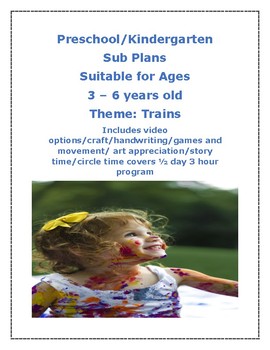Lesson Plan SUB PLANS Trains Theme Pre-k to Kinder Reggio Centers Play Based
- PDF
Description
Introducing our exciting half-day preschool sub lesson centered around the theme of trains, featuring an art project inspired by the renowned artist Edvard Munch.
Here's why my Trains-themed sub lesson is perfect for your preschoolers:
- All Aboard the Learning Express: Our sub lesson takes your preschoolers on a thrilling journey through the world of trains. From exploring different types of trains and their functions to understanding the importance of transportation, children will immerse themselves in hands-on activities that promote curiosity, motor skills, and cognitive development.
- Artistic Expression: Our sub lesson incorporates an art project inspired by the iconic artist Edvard Munch. Preschoolers will have the opportunity to create their own train-themed artwork, drawing inspiration from Munch's expressive style. This hands-on art activity encourages creativity, self-expression, and an appreciation for diverse artistic techniques, setting the foundation for a lifelong love of art.
- Language and Literacy Development: The Trains-themed sub lesson provides ample opportunities for vocabulary enrichment and language development. Through train-related stories, songs, and discussions, children will expand their vocabulary, improve their communication skills, and build a solid foundation for literacy. The engaging activities will spark their imaginations and enhance their love for language.
- Cognitive Skills and Problem Solving: Our sub lesson stimulates critical thinking and problem-solving abilities in preschoolers. Engaging activities such as building train tracks, solving puzzles, and matching train parts promote logical reasoning, spatial awareness, and early math skills. Children will learn to analyze, strategize, and find solutions, developing essential cognitive skills for their future academic success.
- Cultural Appreciation: Introducing young learners to the works of Edvard Munch allows them to explore different artistic styles and foster an appreciation for art diversity. Through discussions and exposure to Munch's art, children will gain an understanding of artistic expression, emotions, and the power of creativity. This exposure broadens their horizons and nurtures an inclusive mindset.
Inside you will find:
1. FULL lesson plan that covers 1/2 day program for preschool or kindergarten
2. craft activity with step by step instructions and easy prep
3. song lyrics and video link options for books and songs mentioned in the lesson plan
4. games that allow for movement in the classroom
5. spaces in the lesson plan to incorporate centers work and outdoor play
6. opportunity to talk about artists that align with theme and have a mini art appreciation lesson
7. worksheet options to practice letter recognition and handwriting
8. story time
9. singing
10. recap of the day
11. Accomodates ELA standards
CLICK HERE to view my freebies
CLICK HERE to view my DRAWING LESSONS
CLICK HERE to view my ART WITH THE MASTERS ART LESSONS
CLICK HERE to view my CONTEMPORARY ART LESSONS
CLICK HERE to view my ART LESSONS THAT COMPLIMENT POPULAR BOOKS
CLICK HERE to view my SELF ESTEEM PROJECTS
CLICK HERE to view my CLASS MURAL IDEAS
CLICK HERE to view my FUN ART FOLK ART LESSONS
CLICK HERE to view my 3 BUNDLED LESSONS
CLICK HERE to view my 5 BUNDLED LESSONS
Make sure to click the GREEN STAR near my store name so that you can stay in touch with my store. I create new lessons every week.





